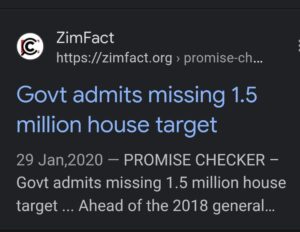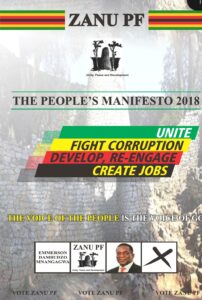Brenna Matendere
Harare—Zanu PF is still insisting that it will go into the 2023 harmonised elections without a manifesto, but analysts describe the decision as a “problematic” attempt to mask the party’s failures in the last five years.
The party has been in power since independence in 1980 and got a fresh mandate in 2018, just under a year after President Emmerson Mnangagwa took over from the late Robert Mugabe with the help of the military.
Zanu PF information and publicity secretary, Christopher Mutsvangwa, told NewsHub that the party did not see the need for a manifesto, adding that the electorate must, instead, judge the party on the basis of its achievements since 2018.
“Talk is cheap”
“As the saying goes, concrete good works speak volumes over a written manifesto. This 2023 election season, the Zanu PF manifesto is a compendium of its projects and services President EDM (Mnangagwa) has actually started, is building and has delivered to the populace under his mantra, ‘Leaving no-one and no place behind’,” he said.
“He has marshalled both domestic and foreign direct investment to produce a whole gamut of goods and services that are increasingly establishing a Brand Zimbabwe in domestic, regional and global markets,” added the wordy party spokesperson.
He cited “the stampede of global top tier billionaires into our carbon steel ecosystem…and mouth-watering investments in a variety of lithium mining projects” as one of the highlight achievements under President Mnangagwa’s leadership.
Zimbabwe is set to overtake the likes of Saudi Arabia and Russia as a petroleum and gas producer, thanks to Zanu PF rule, according to Mutsvangwa who, however, also noted that the world was moving away from fossil fuels.
Ziyambi Ziyambi, Mnangagwa’s chief election agent and outgoing Justice minister, weighed in and said voters must assess Zanu PF and its presidential candidate on the basis of the projects implemented by government.
“Our deeds are our manifesto. We aren’t producing a written manifesto outside of our actions,” he said.
Zanu PF launched its election campaign in Chipinge, Manicaland province, last June but did not unveil a manifesto as party spin-doctors had earlier promised.
Since then, President Mugabe has led whistle-top star rallies across the country where he and other party gurus have been hammering in on purported successes in agriculture, power generation, road infrastructure and mining.
On the other hand, Citizens Coalition for Change (CCC), Zanu PF’s fierce rival, recently launched a belated 97-page manifesto which pledged a US$100 billion economy within the next 10 years.
Zanu PF accused CCC of plagiarising its ideas, even in the absence of its own manifesto.
Political analysts say the Zanu PF manifesto no-show is a worrying break with the party tradition whereby it has been producing written election pledges for a long time.
Unconventional
Eldred Masunugure, one of Zimbabwe’s most established political scientists, said the decision not to produce a manifesto by Zanu PF was “unconventional” and denied the electorate the platform to make informed decisions at the elections.
“This is an unusual break from tradition by one of Zimbabwe’s biggest political parties. A manifesto is an instrument around which a political party must marshal support.
“It is a proposed social contract on whose basis voters must judge the party. If you break away from the tradition of offering the pledge, you block the avenue for informed judgment,” said Masunungure.
He added that Zanu PF seemed to be trying to avoid scrutiny from the electorate.
“Fundamentally, elections are quid pro quo. Voters must offer their votes on the basis of what the party is offering. However, Zanu PF may be trying to avoid being assessed on the basis of its promises.
“It could be avoiding questions around the 2018 social contract it made with the electorate, especially in a context whereby it has failed to deliver on its promises,” he said.
Critics have said the post-Mugabe Zanu PF lacks strong intellectuals capable of crafting compelling political blueprints.
Masunungure, however, said that, contrary to this belief, Zanu PF under Mnangagwa might have deliberately marginalised intellectuals. “You no longer have the likes of Jonathan Moyo at the forefront in Zanu PF,” he told NewsHub.
In past elections, Zanu PF reportedly depended heavily on the brains of individuals like Jonathan Moyo, who was pushed out during the 2017 takeover.
Stephen Chan, a professor of politics at the University of London’s School of Oriental and African Studies, said Zanu PF could have been discouraged from producing a manifesto by its failure to fulfill its 2018 promises.
“It is generally felt that Zanu PF did not live up to its promises at the last election. Discretion may be the better part of valour this time: making no promises at all,” he said.
Ducking responsibility
For Rashweat Mukundu, a Harare-based analyst, Zanu PF is avoiding being held accountable.
“It’s a fear to be held accountable for their (Zanu PF’s) failures after the elections. Therefore, the ruling party will rather speak on what they think are their successes in areas like roads or infrastructure,” he said.
Another analyst, Vivid Gwede, insisted that Zanu PF must still have shared a manifesto even if it was of the opinion that it had recorded impressive achievements.
But, according to him, “on most accounts”, the post-Mugabe Zanu PF had a “dismal record”.
Despite bragging that it has made numerous across-the-board achievements warranting re-election, critics maintain that the Mnangagwa-led government has been struggling to live up to most of the promises it made at the 2018 elections.
Eradicating poverty
In its 2018 manifesto, the party promised that “the Zanu PF government will implement measures to eradicate poverty and inequalities”, recover the economy and promote access to basic needs by all citizens.
It also promised to create strong social safety nets and boost budgetary allocations for social welfare, in addition to promoting food and nutrition programmes at schools.
However, available information—even from government-controlled agencies—indicates that this has not been achieved.
Inflation, on the other hand, keeps rising, leaving the majority of Zimbabweans struggling to put food on the table, while hardly any funds have been allocated for social safety nets.
The latest report by Global Finance Magazine lists Zimbabwe amongst the world’s poorest nations.
Zimbabwe is now among the top 20 poorest countries in the world, at 17th.
Housing
In 2018, the government promised to deliver 1.5 million houses, which it said would be built in the following five years, translating to an average of 300, 000 housing units per-year.
However, Local Government deputy minister, Daniel Garwe, revised the figure to between 20,000 and 30,000 in 2020.
“The target that we were given by government is 100 000 per year, but because of other challenges, if we achieve between 20 000 to 30 000 per year we would have done well,” he was quoted by The Herald in January 2020.
Even then, there is no evidence that the government has managed to meet the revised targets.

Health service delivery
The country’s health facilities have largely been ground to a halt by Zimbabwe’s worsening socio-economic crisis, corruption and mismanagement that have forced citizens to trek to neighbouring countries for treatment.
Last year, the head of health in South Africa’s Limpopo province, Phophi Ramathuba, took a swipe at President Mnangagwa over his leadership failure, particularly in the health sector, which she said was burdening her country’s public hospitals through uncontrolled migration and medical tourism.
In May, the chairperson of Zimbabwe’s parliamentary portfolio committee on Health, Ruth Labode, revealed how radiotherapy cancer treatment machines at Bulawayo’s Mpilo Central Hospital — purchased by the taxpayer for US$2 million — have not functioned for four years because central government has not bought spares worth US$80 000.
Job creation
In the run up to the 2018 general election, Zanu PF promised more than two million jobs, free primary and secondary education, among others, which it has failed to deliver.
ZANU_PF_2018_MANIFESTO_ENGLISH_ (39.51)
Zanu PF launched its 2018 election campaign manifesto under the theme “Unite, Fight Corruption, Develop, Re-Engage, Create Jobs”.

However, working conditions have hit rock bottom which has seen the skilled workforce seeking greener pastures outside the country.
For instance, the nurse aide certificate has become the new gold for Zimbabweans, whose most preferred destination is the United Kingdom, which has a huge deficit for frontline health workers and carers.
Unemployment remains high, with independent estimates indicating that more than 80 percent of employable Zimbabweans are out of formal jobs and have been forced to rely on the informal market for basic subsistence.
Zimbabwe has of late been recording high volumes of migration to better performing economies in the region, UK, USA, Middle East and Europe to escape worsening joblessness and poverty.
Power supply
The government recently managed to synchronise the Hwange Unit 7 power station that was built by the Chinese, resulting in improved power supplies in some areas in the last two or so months.
Ironically, though, numerous areas that were not experiencing serious power cuts before are reporting longer outages.
Many residential areas are still going for over 18 hours without electricity since the fourth quarter of 2022.
The power crisis was precipitated by a combination of the negative effects of climate change, poor planning and economic mismanagement.
Industry, which has been severely affected by power cuts, are yet to report significant improvements in electricity supply while the government has not managed to roll out any meaningful rural electrification in the past five years.
“Mega projects”
The Mnangagwa administration is pitching its campaign on several “mega projects” that, in addition to the Hwange power upgrades, include a number of new steel, lithium and chrome projects.
The list also includes gas, the new parliament in Mt Hampden as well as airport and road rehabilitation.
Gas exploration is still ongoing, tangible macro-economic benefits of the mines are yet to be documented while the upgrade of the Robert Gabriel Mugabe International Airport and the new parliament are considered elitist project.


Comments are closed.